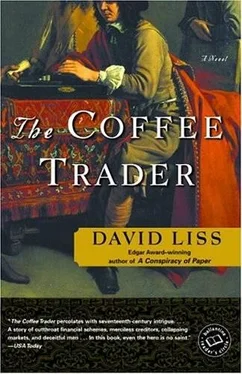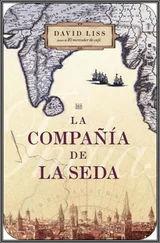Miguel resented Geertruid’s refusal to talk about her companionship with Hendrick, but he understood her to be a woman well able to keep a secret, and that was a quality not to be underestimated. She knew their friendship could cause Miguel problems with the Ma’amad and so rarely showed herself at taverns where Jews congregated-or, if she did have business there, she pretended not to know Miguel. Certainly he had been seen speaking to her a little intimately once or twice, but that was the very beauty of her being a woman-she was invisible to the men of the Nation. If they saw her at all, they saw her as Miguel’s whore; he had even been teased once or twice for liking his Dutchwomen overripe.
Miguel arrived at the Dam a quarter of an hour before noon, when the Exchange gates would open. Already the din of trade had begun to echo off the walls of the surrounding buildings. The burgomasters had limited the hours of trade from noon until two because the guilds complained that the din of commerce disturbed all manner of business across the city. Miguel thought the charges absurd. The sound of trade was a monetary aphrodisiac; it drove men to empty their purses. If the hours of trade were twice as long each day, the city would be twice as rich.
Miguel loved the excitement that spread across the plaza in the moments before the Exchange gates opened. The conversation quieted to a hum. Dozens of men looked like racers, awaiting the signal to begin their sprint.
All along the Dam, peddlers hawked bread and pies and trinkets in the shadow of the great wonders of the plaza, the monuments of Dutch grandeur: the massive and imposing Town Hall, which stood like a civic cathedral; the Nieuwe Kerk and the Exchange; and, puny by comparison, the Weigh House. Along the Damrak, fishmongers shouted their wares in the busy market, and whores cast their lines for amorous investors; moneylenders operating outside the law looked for the eager and desperate; fruit and vegetable sellers wheeled their pushcarts through the maze of merchants eager to spend newly got money on anything polished or juicy or bright with color. Tradesmen joked amiably with fat-pursed merchants, and women attempted to shock men into purchases with talk so bawdy that even Miguel blushed to hear it.
Among the brokers and speculators, black suits such as Miguel always wore remained the height of Dutch fashion. Here was perhaps the height of the austere influence of the Calvinist divines. The preachers of the Reformed Church ruled that gaudy fashions and bright colors only indulged vanity, and thus the men of Amsterdam dressed in modest black but spiced their dark ensembles with fine cloth, expensive lace, silk collars, and costly hats. The sea of black occasionally sparkled with an Iberian Jew in red or blue or yellow or perhaps a defiant Dutch Catholic who dressed in what colors he liked. In other lands the locals would gawk at foreign dress, but there were so many aliens in the city that strange clothes were admired more often than ridiculed. Miguel believed the Dutch the most curious of all races-the perfect blend of Protestant faith and business ambition.
As Miguel gazed out at the crowd he noticed a desperate-looking fellow moving directly toward him. He thought the man might be a petty tradesman, perhaps in the midst of a dispute with a customer, but as he stepped aside the ruffian continued to fix his gaze on Miguel.
The fellow stopped and flashed a mouth full of wretched teeth. “You don’t know me, Lienzo?”
The sound of the voice steadied him. Miguel saw that he did indeed know the man: Joachim Waagenaar. Joachim, who had once dressed like a gentleman in velvet suits and fine lace, now wore the close-fitting leather cap of a farmer, a stained doublet of rough cloth, and torn, baggy breeches. Once a man to wear perfume and trim his mustache just so, Joachim now smelled of piss and sweat like a beggar.
“Joachim,” he said after a moment. “I didn’t recall you at first.”
“I suppose not.” He unfurled another strained grimace. He’d always had unhealthy teeth, but several that had been broken before were now gone, and along the bottom they were all cracked and had the rough edges of gravel. “Times haven’t gone well with me.”
“I was sorry to hear of your losses,” Miguel answered, speaking so quickly that his Dutch sounded garbled even to his own ears. “I lost greatly too,” he added hastily, in answer to unspoken charges. He had, after all, urged Joachim to put his fortune in Miguel’s failing sugar futures, believing that if he found enough investors he could keep the price of sugar buoyant, but these efforts were like sandbags set against the force of a flood, and the price had tumbled all the same. Joachim had not lost nearly as much as Miguel, but his fortune had been much smaller, so he had fallen fast and hard.
“Those are fine clothes you have upon your back.” Joachim looked him up and down and ran a hand along his own face, which was rough with a beard that grew in a great diversity of lengths, as though he had taken to shaving by hacking at himself with a dull blade. “They did not take your clothes,” he said. “They took my clothes. They forced me to sell them.”
Who might they be-creditors, pawnbrokers? Miguel had been abducted and taken to taverns where he was held prisoner until he agreed to pay bills. He had suffered the humiliation of having his hat knocked into the mud by a particularly angry wine merchant. He had been threatened and insulted and angered beyond all reason. But he’d never been made to sell his clothes.
Who could say what might happen to an odd fellow like Joachim. The son of a fishmonger who had profited in the tulipomania thirty years before, Joachim had come of age believing that only fools labored for their money when they might buy and sell for it instead. Even so, he seemed to know nothing of the Exchange but which taverns were closest, and he always depended on brokers to do his thinking. But for a man who was little more than a drunk with money, he was remarkably anxious about holdings, and he’d always fretted over a stuiver lost here and there, suspicious of the very means by which he chose to make his money.
“The business of the Exchange is like the weather,” Miguel had told him once. “You might see signs of rain, but then nature delivers sunshine.”
“But what has happened to my guilders?” Joachim had asked him, after losing a trifling fifty guilders in an East India deal that had not gone quite as Miguel had expected.
Miguel forced a laugh. “Where is the wind after it blows on your face?” He almost added that any man who wonders such things should remove his money from the Exchange and return to selling. Joachim seemed to Miguel ill-suited for this new species of investment, but Miguel did not have so many clients that he could afford to send one away.
Joachim now stood there, panting like a dog, letting his breath blow in Miguel’s face. In the distance the gates to the Exchange opened, and the traders began to file inside, some of the more eager men shoving like unruly boys.
Although everyone had his own affairs to tend to, Miguel worried that someone might see him with this wretch. The burghers of Amsterdam had forbidden Jewish traders to broker for gentiles, and though the Ma’amad claimed to punish this crime with excommunication, Miguel believed it to be the second most violated law in the city (just after the law prohibiting brokers to trade for their own profit as well as their clients’). Nevertheless, a man in Miguel’s situation had to fear being prosecuted for crimes that others could perpetrate with impunity. This conversation with Joachim would have to end quickly.
“I am sorry things have gone hard with you, but I haven’t the time to speak of it now.” Miguel took a tentative step back.
Читать дальше












